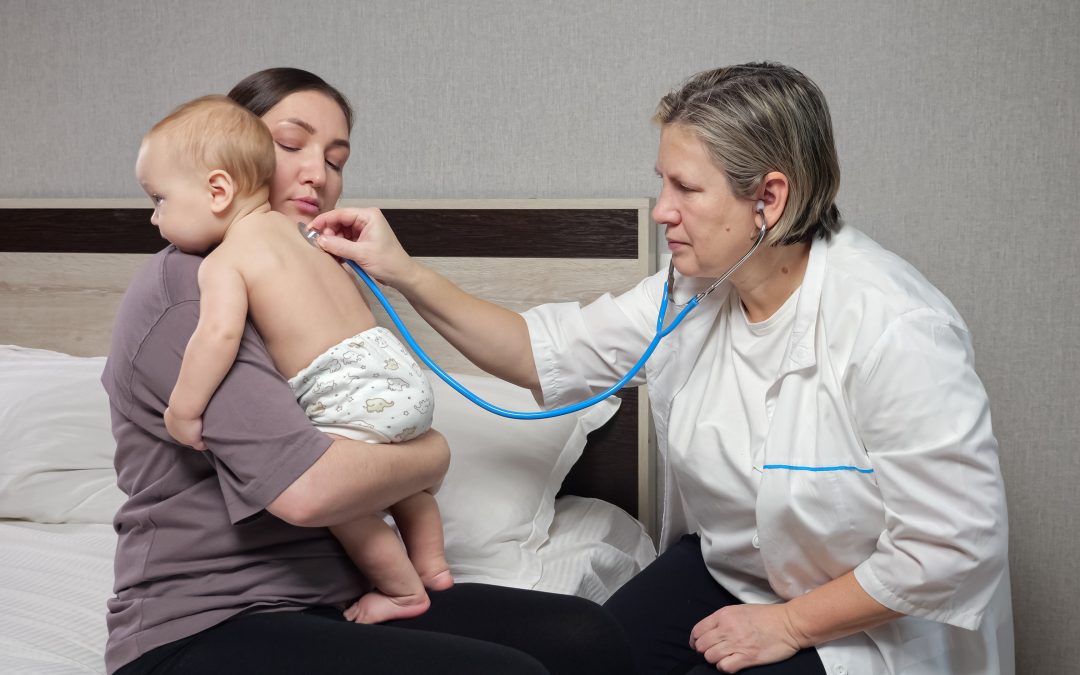Strep throat is a bacterial infection caused by Group A Streptococcus (GAS) that affects the throat and tonsils. While common in older children, it’s unusual but severe in infants.
Babies under one year rarely get strep because their immune systems respond differently, and their tonsils are not yet fully developed. However, when it does occur, it can become dangerous quickly without prompt medical treatment.
In Naperville, pediatricians emphasize the importance of early diagnosis and care, as untreated strep can lead to complications such as ear infections, pneumonia, or even blood infections.
Parents must pay close attention to symptoms like fever, refusal to feed, or irritability—especially if someone in the household has strep throat.
Strep Throat Is Riskier for Infants
Infants have developing immune systems, making it harder for them to fight bacterial infections effectively. Even a small bacterial load can cause inflammation that spreads beyond the throat.
Additionally, babies cannot describe pain, so infections often go unnoticed until symptoms worsen.
Another challenge is dehydration. Babies with sore throats may refuse milk or water, leading to serious complications in just a few hours. Because of this, strep throat in infants is considered a medical urgency.
For more about how strep spreads and becomes severe, check out “How strep throat is transmitted?” and “Strep throat symptoms,” which explain how the infection develops and worsens.
1. Immature Immune System Makes Babies Vulnerable
Infants have underdeveloped immune systems, which means their bodies cannot fight bacteria as effectively as older children or adults. When Group A Streptococcus bacteria enter the system, they can multiply quickly and spread beyond the throat.
2. Difficulty Communicating Discomfort
Unlike older children, infants cannot describe pain or soreness, which makes diagnosing strep throat more challenging. Parents may only notice subtle signs, such as reduced feeding, crying during swallowing, or restlessness.
3. Higher Risk of Dehydration and Nutrient Loss
A sore throat can make feeding painful, and babies may refuse to nurse or drink formula, leading to rapid dehydration. Since infants rely on liquid nutrition, even missing a few feedings can quickly affect their hydration levels and overall health.
Signs of Strep Throat in Infants
Identifying strep throat in babies is difficult because symptoms often overlap with viral infections or teething discomfort. However, there are key signs parents in Naperville should look for:
- Persistent fever (above 101°F or 38°C)
- Refusal to feed or difficulty swallowing
- Excessive irritability or constant crying
- Red, swollen throat with or without white patches
- Rash or flushed skin (possible scarlet fever sign)
- Swollen neck glands
- Lethargy or lack of responsiveness
If your infant shows several of these symptoms, visit a Naperville pediatric clinic or urgent care right away. Early testing and antibiotics can prevent severe illness. You can also explore how to get rid of nasal congestion fast to help ease your baby’s breathing discomfort while awaiting medical evaluation.
How Doctors Diagnose Strep Throat?
Diagnosing strep throat in infants requires extra care and precision. Unlike adults, babies cannot describe their pain or symptoms, so doctors rely on physical signs, medical tests, and careful observation.
In Naperville, pediatricians use safe, quick diagnostic methods to ensure infants receive accurate treatment as early as possible.
During the first step, the doctor performs a physical examination—checking the baby’s throat, tonsils, and lymph nodes for redness, swelling, or pus-like spots.
They may also examine the ears and chest to rule out other infections. Because infants can have overlapping symptoms from colds or teething, this initial assessment is essential for accuracy.
1. Clinical Evaluation
Doctors start with a physical examination, checking for throat redness, swollen glands, or a fine rash. They also assess feeding patterns and hydration levels to determine the infection’s severity.
2. Rapid Strep Test
A gentle throat swab is used to detect Group A Streptococcus. Results appear within minutes. A positive result means antibiotics should begin immediately.
3. Throat Culture
If the rapid test is negative but symptoms remain concerning, doctors send the sample to a lab for culture testing, which confirms the diagnosis with greater accuracy.
For an overview of diagnostic accuracy, you can review blood tests performed in our lab to learn how quickly lab testing helps detect infections safely in children.
Complications That Can Arise From Untreated Strep Throat
Untreated strep throat in infants can quickly turn serious because their immune defenses are still developing. When Group A Streptococcus bacteria are not controlled, the infection can spread beyond the throat and cause secondary complications that affect the ears, sinuses, or bloodstream.
In some infants, strep can cause scarlet fever, a condition characterized by a red rash and a high fever. In rare but severe cases, bacteria may enter the bloodstream, leading to sepsis —a potentially life-threatening condition that requires hospital care. Parents should never wait for symptoms to worsen before seeking treatment.
Even if your baby shows minor signs of illness, a quick visit to a Naperville pediatric clinic can make a significant difference in preventing these complications.
Potential complications include:
- Ear infections (otitis media)
- Sinus infections
- Scarlet fever
- Sepsis or bloodstream infection
- Rheumatic fever (in rare cases)
Is Strep Throat Dangerous?
Yes — strep throat can be dangerous for infants if left untreated. Because their immune systems are immature, bacteria can quickly spread to the ears, sinuses, or bloodstream. This can lead to serious complications such as:
- Scarlet fever: A red rash that spreads across the body.
- Ear or sinus infections: Common secondary infections.
- Sepsis: Bacteria entering the bloodstream, potentially life-threatening.
- Rheumatic fever: A rare but serious condition affecting the heart and joints.
If your infant shows several of these symptoms, visit a Naperville pediatric clinic or urgent care right away. Early testing and antibiotics can prevent severe illness.
You can also explore how to get rid of nasal congestion fast to help ease your baby’s breathing discomfort while awaiting medical evaluation.
Treatment and Recovery
Once strep throat is confirmed, treatment begins immediately to prevent complications. The primary goal is to eliminate the infection, ease discomfort, and support faster recovery.
Doctors in Naperville typically prescribe infant-safe antibiotics, such as amoxicillin or penicillin, to treat Group A Streptococcus. Parents need to complete the full course, even if the baby appears better within a few days. Stopping antibiotics early can lead to relapse or antibiotic resistance.
1. Antibiotic Therapy
Antibiotics like amoxicillin or penicillin are prescribed to clear the bacteria. Infants usually respond within 48–72 hours, but it’s vital to complete the entire course to prevent recurrence.
2. Supportive Care
Parents should ensure the baby stays hydrated, rested, and comfortable. Continue breastfeeding if possible—breast milk boosts immunity and soothes the throat.
3. Monitoring for Complications
Doctors may schedule a follow-up visit to confirm the infection is entirely gone. If the baby’s fever returns or new symptoms develop, further evaluation may be needed to rule out complications. Learn more about post-recovery care, including why same-day medical attention is essential for managing health outcomes and the importance of timely follow-ups for better recovery.
Preventing Strep Throat in Infants
Prevention focuses on limiting exposure and maintaining good hygiene:
- Wash your hands frequently before touching or feeding the baby.
- Avoid close contact if anyone at home has strep throat.
- Clean bottles, pacifiers, and toys regularly.
- Cover coughs and sneezes around the baby.
- Continue breastfeeding to maintain immune strength.
For family hygiene tips, check how effective hygiene habits can reduce the risk of pink eye transmission.

When to Visit a Naperville Pediatric Clinic?
Parents should seek medical care immediately if their baby has:
- A persistent fever above 101°F
- Difficulty breathing or swallowing
- Rash with a sore throat
- Extreme fussiness or weakness
- Signs of dehydration, such as dry lips or fewer wet diapers
Infants can deteriorate quickly, so don’t delay medical attention. Clinics in Naperville offer same-day appointments for urgent cases, ensuring infants receive fast and safe treatment.
Helpful Information:
Learn more about infection management and child health:
- How Is Strep Throat Transmitted
- Can Mouthwash Prevent Strep Throat
- Banish the Bug: Your Ultimate Guide to Flu-Proofing Your Home
For More Details:
The Mayo Clinic resource, Strep Throat in Children, provides reliable, doctor-reviewed information on strep throat symptoms, risks, and treatment options for children and infants.
FAQs
1. Is strep throat common in infants?
No. It’s rare but possible, especially if the baby is exposed to someone with strep throat.
2. Why is strep throat more dangerous for infants?
Their immune systems are underdeveloped, making it easier for bacteria to spread and cause complications.
3. Can breastfed babies get strep throat?
Yes, though it’s rare. Breastfeeding provides some protection but not complete immunity.
4. What are the early signs of strep in babies?
Fever, refusal to eat, irritability, and redness in the throat.
5. How is strep throat treated in infants?
With safe antibiotics prescribed by a doctor, along with fluids and rest.
6. Can untreated strep cause long-term harm?
Yes. It can lead to complications like scarlet fever or rheumatic fever.
7. Can parents pass strep throat to their baby?
Absolutely. It spreads through respiratory droplets and close contact.
8. Is hospitalization ever needed?
In severe cases with dehydration or sepsis, hospital care may be required.
9. How long does recovery take?
Most infants recover within one to two weeks with proper care.
10. When should I visit a Naperville clinic?
If your baby has a fever, a red throat, a rash, or difficulty feeding, visit a Naperville pediatric urgent care center immediately.

